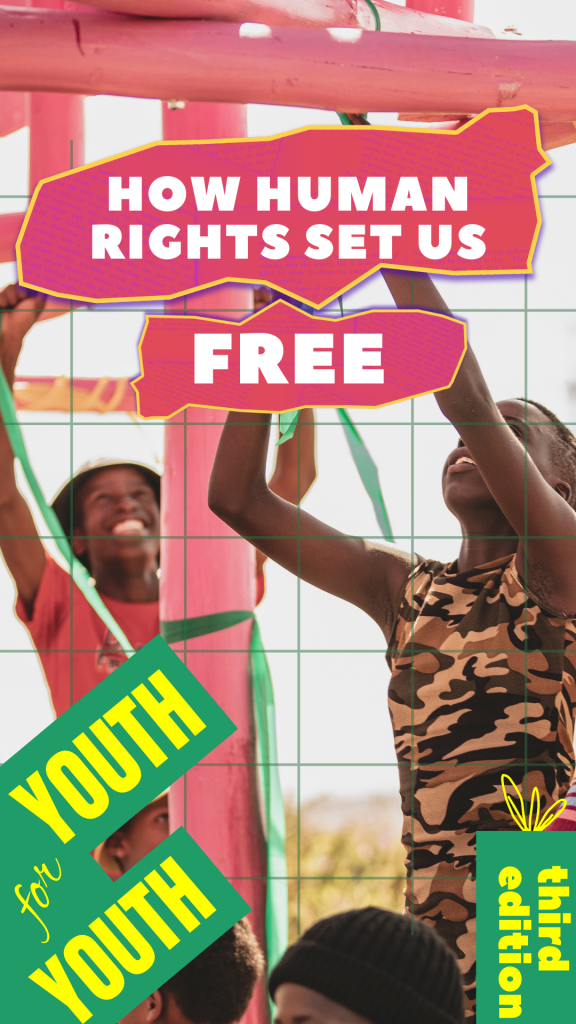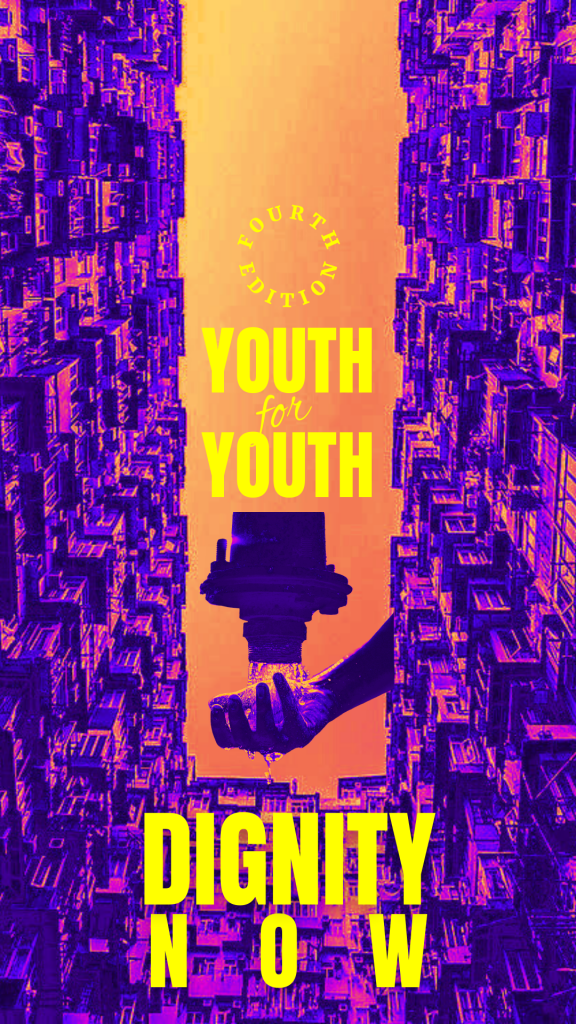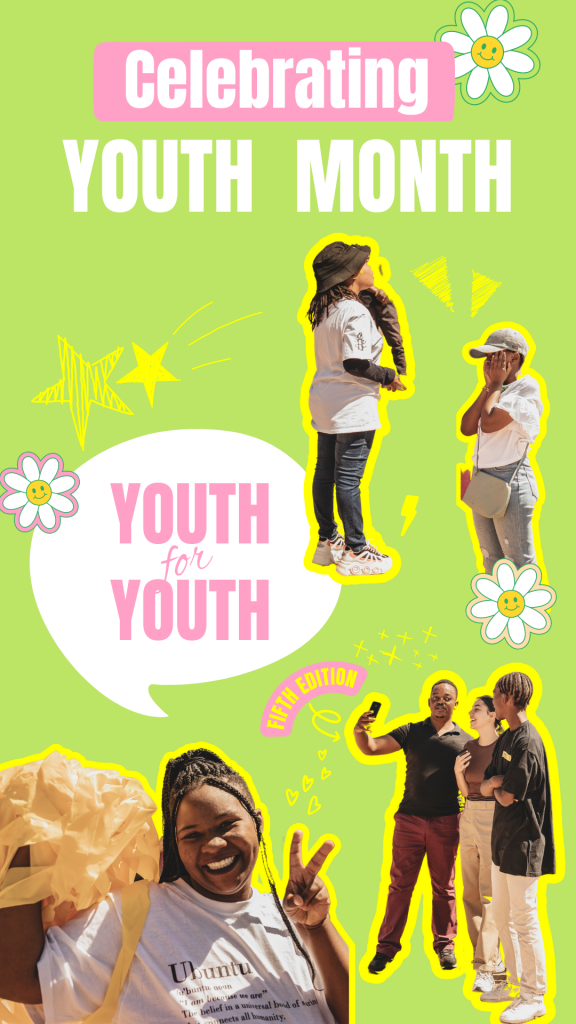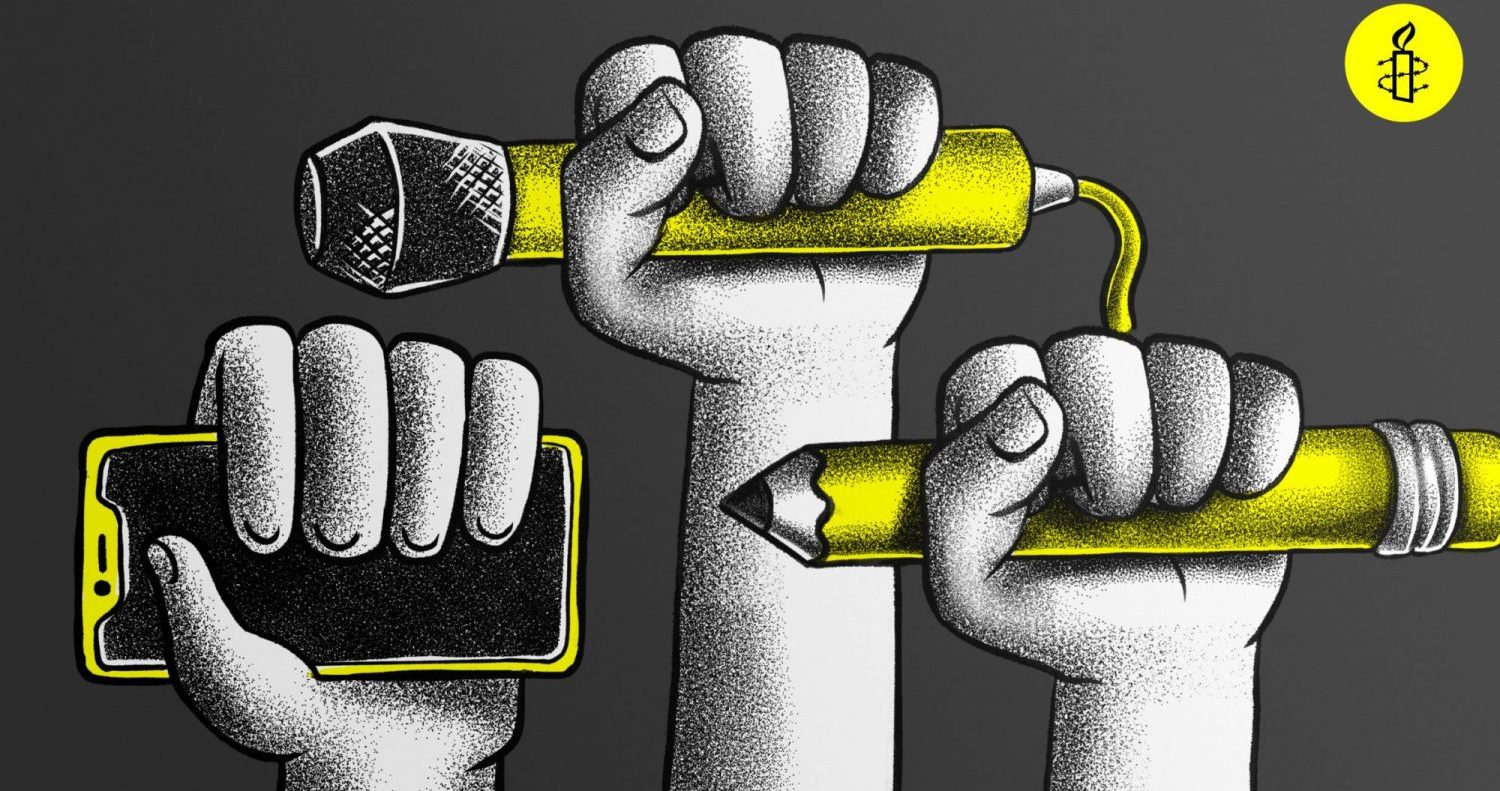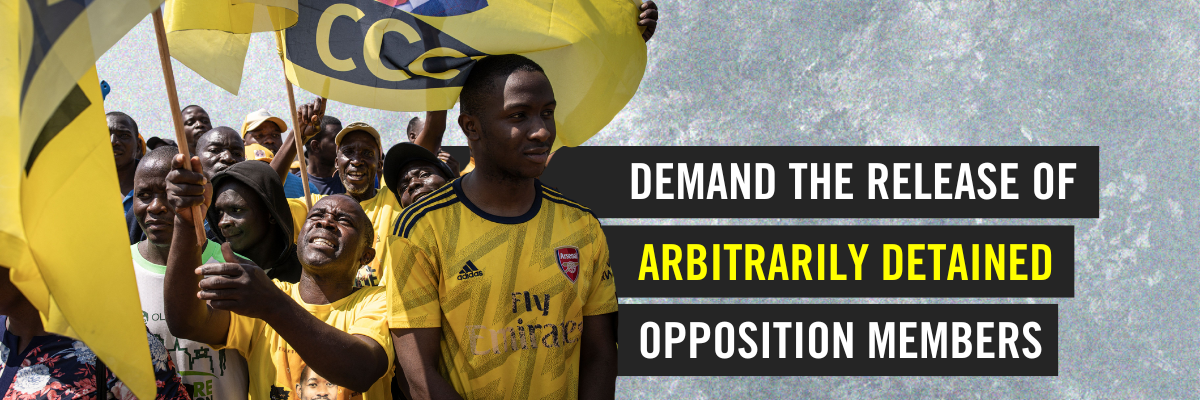South Africa is in a precarious situation as a country.
The government is battling to keep the lights on and provide other basic services such as safe, clean water and healthcare; people living in South Africa, especially women and children, are not safe as incidents of crime continue to increase; and we are in the middle of a cost of living crisis, with thousands facing hunger or trapped in a cycle of poverty and deprivation.
Looking at the many crises facing the country, it is clear that everything needs a complete overhaul, especially if people’s basic rights are going to be realised.
One of our biggest fights continues to be ensuring that something is done about the gender-based violence epidemic in South Africa. A big part of this is the handling of cases by the SA Police Service (SAPS). It is quite clear that there needs to be a complete overhaul of the SAPS so that it is fit for purpose to deal with the extremely high levels of crime. The recent crime statistics show that the murder rate in South Africa is at an alarmingly high level with an average of 69 people being killed a day from January to March 2023. The investigation of cases is dismal and because of this, there are little consequences for perpetrators of heinous crimes such as murder, rape and sexual assault.
In this edition of Lesedi we explain why this overhaul is important. Our best example of this is the case of Popi and Bongeka, who were killed six years ago and still, up until today, there has been no justice for their murders. Amnesty International South Africa activists picketed outside the National Prosecuting Authority’s office in Pretoria demanding justice for these two young ladies.
Women in this country continue to live in fear and yet we are still waiting for the government to set up the National Council on Gender-Based Violence and Femicide (NCGBVF). You can read about the submission AISA made on the NCGBVF Bill.
Our team continues to put in a lot of work and time into fighting GBVF in South Africa and as part of our human rights education, they have also produced an amazing course on consent.
In this edition of Lesedi, we also give you an update on the Bill to decriminalise sex work. Unfortunately, we will not see that happen this year and we explain why there’s been a delay.
The right to safe, reliable water has also come to the fore again this quarter, especially after the cholera outbreak in Hammanskraal, outside Pretoria.
It is truly unacceptable that in this day and age there are still people who cannot rely on the government providing them safe drinking water, and because of that they are getting sick and dying. Again, another sector which has been ravaged by corruption and needs a complete overhaul.
The country’s health system is also in complete disarray and yet the National Health Insurance Bill was passed in the National Assembly. It is all very well to pass the Bill, but until the heath system is completely overhauled, national health insurance will never be a success. Our researcher, Marike Keller, breaks down our concerns with the bill.
The government is misleading people, and this comes ahead of next year’s election. This shows that they are not serious about tackling healthcare, but more about retaining power. After all the politicking, people are still dying and are not able to access quality healthcare. As we go to elections we are going to see more and more of this type of politicking at the cost of human rights and service delivery.
While all of this has been happening, the government has also been trying to stave off a diplomatic crisis after the International Criminal Court (ICC) issued an arrest warrant for Russian president Vladimir Putin. South Africa is a signatory of the Rome Statute of the ICC, and if President Putin steps foot in the country, as he plans to do in August when he attends the BRICS summit, South Africa is obligated to arrest him. This has once again sparked a debate on whether South Africa should withdraw from the ICC. As Amnesty International we say no. We advocated for the establishment of a worldwide system of international justice to step in when states cannot or will not act, including campaigning for the establishment and effective operation of the ICC. We firmly believe that the ICC can play a unique role in pursuing justice for victims of crimes under international law and in investigating and prosecuting those suspected of responsibility for such crimes, without fear or favour, no matter how great the political or economic power of certain actors.
We need to stand up and ensure that human rights are protected here in South Africa, but also globally.
As former president Nelson Mandela said: “For to be free is not merely to cast off one’s chains, but to live in a way that respects and enhances the freedom of others.”
Aluta Continua!
Shenilla Mohamed
SEEKING JUSTICE FOR POPI & BONGEKA
By Genevieve Quintal, Amnesty International South Africa Media and Communications officer
On Friday, 9 June 2023, Amnesty International South Africa held a picket outside the National Prosecuting Authority’s (NPA) head office in Pretoria, demanding justice for Popi Qwabe and Bongeka Phungula, who were brutally murdered six years ago.
Since their murders, the families have received little to no communication on the status of the case, leaving them in the dark with no hope of justice being served.
Representatives from the NPA came out to receive signatures of people demanding justice for Popi and Bongeka and committed to providing AISA with feedback by 15 June.
On 30 June, we finally received an update informing us that the NPA does not have enough evidence to prosecute the cases of Popi and Bongeka, but has however referred the matter to the magistrate at the Protea Court for an inquest to be held into their deaths.
In a letter to AISA executive Director Shenilla Mohamed, National Director of Public Prosecutions Shamila Batohi said the Director for Public Prosecutions (DPP) in Gauteng had decided that there was insufficient evidence at this stage to proceed with prosecution, the decision had been taken to refer the matter to an inquest. If the magistrate makes a finding that any person is “prima facie” responsible for the death of the two women, the magistrate must refer the matter back to the DPP to consider the findings of the inquest and to decide afresh if a prosecution should be instituted.
While this is not the ideal outcome and means that the families of Popi and Bongeka still have to wait to see if they will ever receive justice, we do welcome the NPA’s decision to refer their cases to a magistrate for an inquest.
(read our full statement on the update here)
On 12 May 2017, Popi and Bongeka were shot dead and their bodies dumped by the side of the road in Johannesburg. They may also have been raped before they were killed. Full forensic evidence reports have never been released and the police investigation that followed was, according to the family, riddled with mistakes. The families claim the police did not check for fingerprints and that the phones belonging to the two girls were never traced. Two suspects who had been apprehended in connection with their deaths were later released and the case was struck off the roll.
In 2020, Amnesty International highlighted Popi and Bongeka’s case during its annual Write for Rights campaign, and the investigation into their murders was reopened, bringing their families one step closer to justice. Over 341,000 Amnesty supporters signed the petition to demand this. The matter was sent back to the NPA in 2021 for a decision on prosecution, but until now there has been no feedback on the way forward.
Popi and Bongeka’s case is emblematic of a failing criminal justice system, including a cycle of impunity that sees little to no justice for victims and survivors of gender-based violence and femicide. The justice system needs to start acting as a deterrent by ensuring that perpetrators are charged in accordance with the law. This can only happen if investigations are conducted thoroughly so that the prosecuting authority is provided with enough evidence to take these matters to court.
AMNESTY INTERNATIONAL’S SUBMISSION IN RELATION TO THE NATIONAL COUNCIL ON GENDER-BASED VIOLENCE AND FEMICIDE BILL
Amnesty International South Africa made a submission relating to the National Council on Gender-Based Violence and Femicide Bill.
The Bill is a step towards fulfilling the resolution made at the 2018 Presidential Summit Against Gender-Based Violence and Femicide (GBVF) to establish a national, multi-sectoral coordinating body to oversee and coordinate the response to GBV and to serve as the custodian of the National Strategic Plan (NSP) on GBVF.
Read the full submission here
Overhauling Police and Investigations in South Africa: A Path Towards Effective Law Enforcement
By Jaclyn Modise, Amnesty International South Africa research consultant
South Africa, like many countries, is grappling with the challenge of ensuring effective and accountable law enforcement. The need for an overhaul of the South African Police Service (SAPS) and its investigation systems has become increasingly evident in recent years. Research by the Medical Research Council found that the highest rate of attrition of reported rape cases in the criminal justice system occurs at SAPS level. Without SAPS conducting thorough investigations, the National Prosecuting Authority (NPA) cannot successfully prosecute and crimes continue with impunity.
Examples of the failure by the police to investigate cases properly, in order for there to be successful prosecutions are the 2017 rape and murder cases of Popi Qwabe and Bongeka Phungula, for which Amnesty International South Africa has been pushing for justice, and more recently the 2022 Krugersdorp rapes. The SAPS handled the investigation of the double murder of Popi and Bongeka with complete apathy and it was riddled with mistakes. Two taxi drivers were arrested on suspicion of the murders following the discovery of a blood-stained taxi. The two taxi drivers were also found to be in possession of a cell phone and lipstick belonging to the women, yet there have been no arrests or a successful prosecution (read more about Popi and Bongeka’s case further down in this edition of Lesedi). Meanwhile, in July last year, eight women were gang raped at an abandoned mine in Krugersdorp while filming a music video. After over 80 illegal miners were initially arrested and attempts were made to link them to the rapes, 14 men were finally accused of, and had charges laid against them for the crime. Following several postponements, the cases against the 14 were dropped in October due to insufficient evidence. Despite the national and global spotlight on this case, the police had arrested the wrong suspects, and had failed to properly investigate and collect sufficient evidence for the NPA to successfully prosecute the case.
The SAPS faces numerous challenges, including corruption, inadequate training, and insufficient resources, resulting in poor investigations which further results in a lack of public trust. To tackle these systemic issues, it is crucial to enhance recruitment and training processes, ensure sufficient resources are allocated to SAPS, implement stricter internal controls, and foster a culture of integrity within the police force.
Improving the quality and efficiency of investigations is crucial for ensuring successful prosecutions. Providing sufficient resources, investing in training programs for investigators, enhancing forensic capacities, and strengthening specialised units which tackle specific crimes (such as gender-based violence) can lead to more effective investigations. Collaboration between the police, prosecution services, and other relevant agencies is essential to streamline information sharing and ensure seamless coordination. Respecting human rights and promoting professionalism within the police force are paramount. Training programmes should emphasise human rights principles, cultural sensitivity, and unbiased policing.
Overhauling the police and investigation systems in South Africa is a critical step towards achieving effective and accountable law enforcement. By addressing systemic issues, strengthening investigations, and promoting human rights and professionalism, the country can lay the foundation for a more trustworthy, effective, and efficient police force.
While implementing these reforms may present challenges, they are essential for restoring public confidence and ensuring the safety and security of all who live in South Africa. It requires collaboration between government institutions, civil society organisations, and the public to create lasting change. Through a comprehensive and holistic approach, South Africa can pave the way for a brighter future in law enforcement.
PRESS RELEASE: CRIME STATISTICS CONTINUE TO PAINT A GRIM PICTURE
There needs to be a complete overhaul of the SA Police Service so that it is fit for purpose to deal with the extremely high levels of crime, Amnesty International South Africa said today following the release of the crime statistics.
“The murder rate in South Africa is at an alarmingly high level with an average of 69 people being killed a day from January to March 2023,” Amnesty International South Africa Executive Director Shenilla Mohamed said.
Murder overall increased by 28.5% since 2019.
“We can no longer allow violent crimes to continue with impunity. The justice system has to act as a deterrent, and the first step is ensuring that the police can conduct thorough, efficient and transparent investigations into all killings, and ensure that the perpetrators are charged in accordance with the law.”
The statistics show that murders of women have also increased by 7.9% and attempted murder by a shocking 21.5% compared to the same reporting period of the previous year.
The murder of children may have dropped by 19.9% this quarter compared to the same quarter last year, but the attempted murder of children has gone up by 8.8%.
“The continued onslaught against women and children in South Africa is shameful. The country has a lot of plans, we have a lot of rhetoric, we have a lot of statements being made by the President and by government officials and we have three new gender-based violence (GBV) laws but we are seeing that no-one is safe, especially women and children,” Mohamed said.
“The government must comply with both its own constitutional and international human rights obligations to do more to protect women and children in this country.
“If the government continues failing to create a safe environment for all, it is violating the right to life and security of the person, and must be held accountable. The buck stops with the government.”
JUST IN: The quarter 4 #CrimeStats still paint a grim picture of violence against women in SA:
— @AmnestySAfrica (@AmnestySAfrica) May 30, 2023
👉969 women were murdered 🔺7.9%
👉1,485 attempted murders against women 🔺21.5%
👉15,141 cases of assault with intent to inflict grievous bodily harm 🔺0.7%
Between Jan & March this year, 164,206 cases of contact crimes were reported. This includes:
— @AmnestySAfrica (@AmnestySAfrica) May 30, 2023
👉 6,289 murders
👉 6,192 attempted murders
👉 11,744 common robberies@SAPoliceService @GovernmentZA more action must be taken to ensure the protection of all who live in SA. #CrimeStats
Between Jan & March this year, 13,205 sexual offences were reported. While reports of sexual offences have decreased overall, gender-based violence remains unacceptably high in South Africa.
— @AmnestySAfrica (@AmnestySAfrica) May 30, 2023
Victims & survivors deserve less talk & more action from @SAPoliceService #CrimeStats
A tough pill to swallow – decriminalising sex work won’t be achieved this year
By Marike Keller, Amnesty International South Africa Researcher
When the Department of Justice and Constitutional Development (DOJCD) released a Bill to decriminalise sex work at the end of 2022, sex workers and allies celebrated a decades-long hard fight to finally get to this point – one step closer for sex workers to fully realise their basic human rights.
Currently, both the buying and selling of sex are fully criminalised – a remnant of archaic, colonial, and patriarchal legislation from a century ago. Anti-decriminalisation proponents make arguments of morality and conflate sex work with human trafficking, which is simply incorrect with no evidence to support this. The criminalisation of sex work has far-reaching negative impacts on sex workers’ rights to health, safety, security, dignity, and life.
Yet in May 2023, a challenge arose in that the State Law Advisor (SLA) refused to certify the Bill. As part of the process to pass a Bill into law, it must be certified by the SLA. In this instance, the SLA found the Bill to be vague and missing a regulatory framework for the sex work industry. The DOJCD has had to go back to the drawing board and has confirmed that it will not be approved during the current administration.
This has been a tough pill to swallow for many.
However, all hope is not lost. The aim of the DOJCD is still for sex work to be decriminalised. And rightly so. Amnesty International South Africa will continue to advocate for full decriminalisation, and support sex workers-led organisations in this pursuit. This must remain a priority for the new administration in 2024 as a matter of urgency. Decriminalising sex work will contribute significantly toward ensuring that the human rights, dignity, and equal worth of sex workers enshrined in our Constitution are protected and respected.
AMNESTY’S SUBMISSION ON THE CRIMINAL LAW (SEXUAL OFFENCE AND RELATED MATTERS) AMENDMENT BILL:
Amnesty International’s research has found that all forms of criminalisation of sex work results in
disproportionate harm to sex workers. Decriminalising sex work will positively impact the lives of sex workers and contribute to South Africa’s national and international human rights obligations.
Take a look at our submission here explaining why criminalisation is harmful and law reform is needed.
One of the Reason We Call for the Decriminalisation, It Will Improve and increase access to health
— Asijiki Coalition (@Asijiki4decrim) June 2, 2023
And Justice Services pic.twitter.com/P9CaYEQxQH
SEXWORKERS DAY – 2 JUNE
Today, and everyday, we honour all sex workers fighting for their rights
CHOLERA OUTBREAK A DIRE CONSEQUENCE OF GOVERNMENT’S MISMANAGEMENT
By Alicia jooste, amnesty international south africa senior programme officer
The recent cholera outbreak is a dire consequence of the government’s mismanagement of the country’s water and sanitation services. At the time of writing this, 43 lives have already been lost to cholera, and there are currently 1,045 suspected cases. Cholera is a preventable and easily treatable disease, therefore, what we are seeing transpire is completely unacceptable.
The cholera outbreak was brought to our attention in Hammanskraal, outside Pretoria, an area that has been failed by multiple administrations when it comes to the delivery of safe, sufficient and reliable water and basic sanitation, forcing residents to protest on multiple occasions for access to these basic human rights. To date, the City of Tshwane and Department of Water and Sanitation are yet to confirm the source of the outbreak.
Behind the crisis is a deadly combination of issues, including non-compliant wastewater treatment works, and the mismanagement of public funds which has led to the under-investment in and maintenance of crucial infrastructure. The recently released interim Green, Blue and No Drop Watch Reports confirmed there has been an overall decline in access to quality and safe drinking water, highlighting that:
In 90 municipalities, 334 wastewater systems are in critical condition. Wastewater systems are important for the removal of sewage from water for it to be reused and/or disposed of safely.
Of the 151 out of 1035 water treatment systems sampled only 5% were in excellent condition. Water treatment infrastructure plays a key role to ensure the microbial and chemical balance is safe for drinking water.
55% of sampled systems demonstrated bad chemical water quality compliance – key for the removal of harmful bacteria and other microorganisms from the water.
The current cholera outbreak cannot be treated as a once-off incident but a wakeup call for the Department of Water and Sanitation to work with all municipalities to invest in and manage South Africa’s water and sanitation infrastructure. As the main oversight body, the department must ensure accountability measures are in place for municipalities that fail to adhere to acceptable water quality standards. This must be an ongoing and multifaceted approach.
Unless the government prioritises the investment in infrastructure and the maintenance of that infrastructure, and tackles corruption and the mismanagement of public funds in the water and sanitation sectors, the right to access safe, sufficient and reliable water and basic sanitation – enshrined in the Constitution – will continue to be threatened and lives risked.
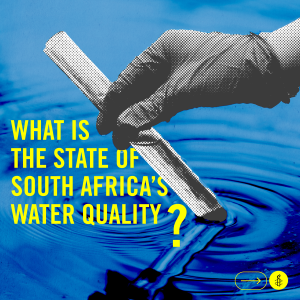
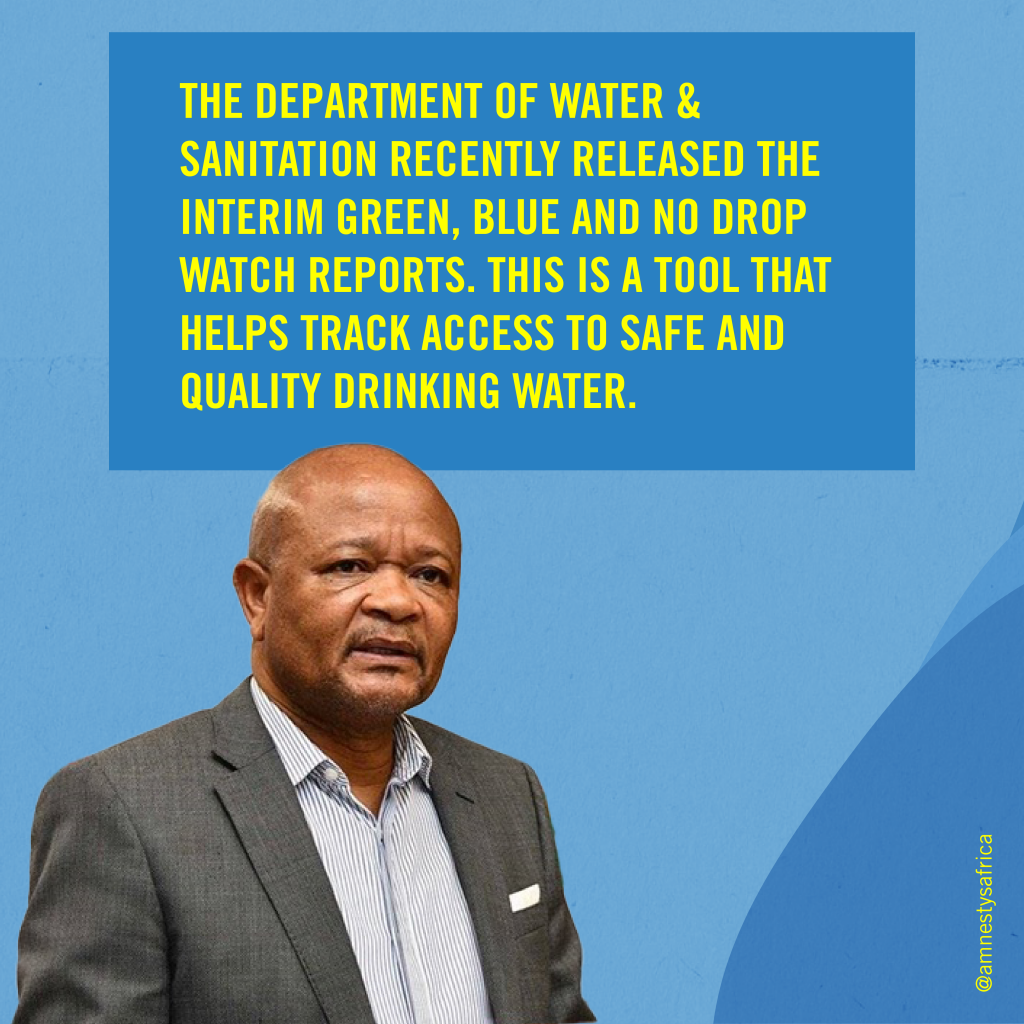
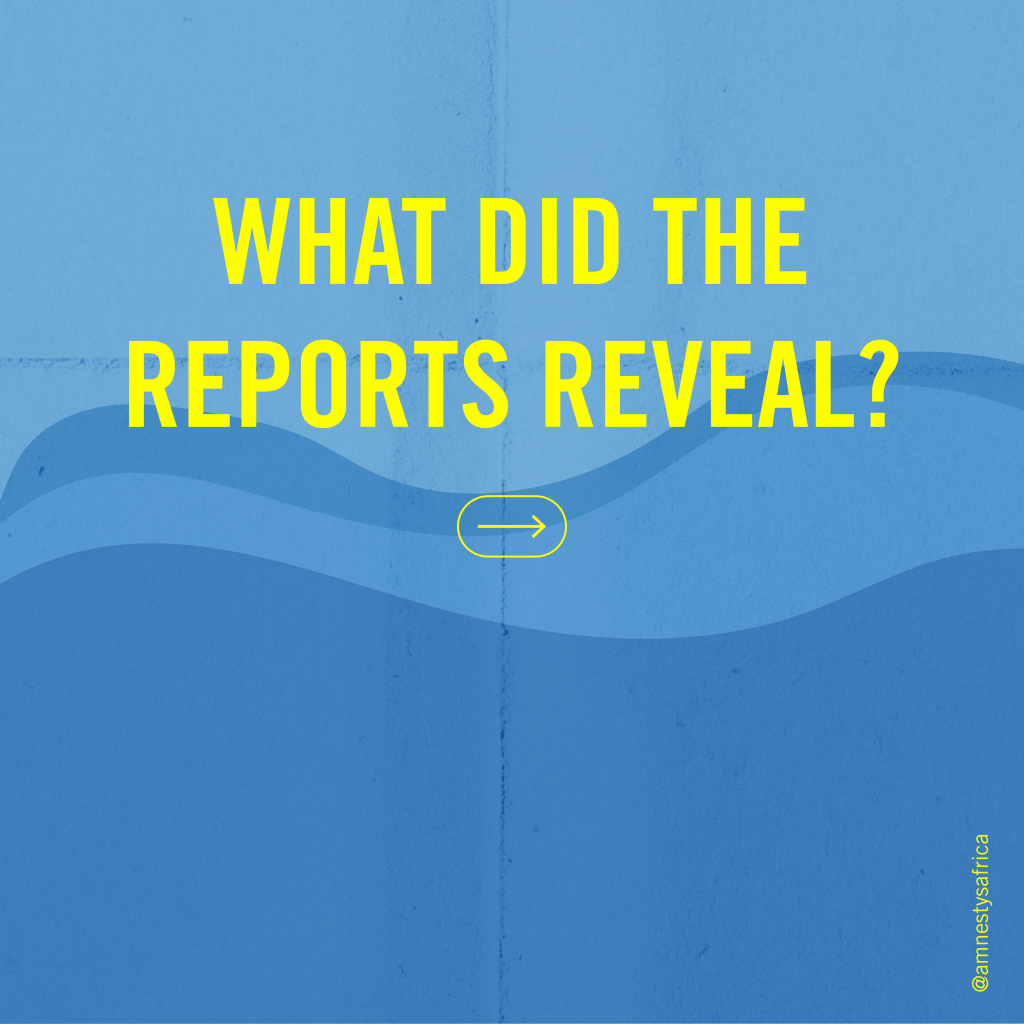
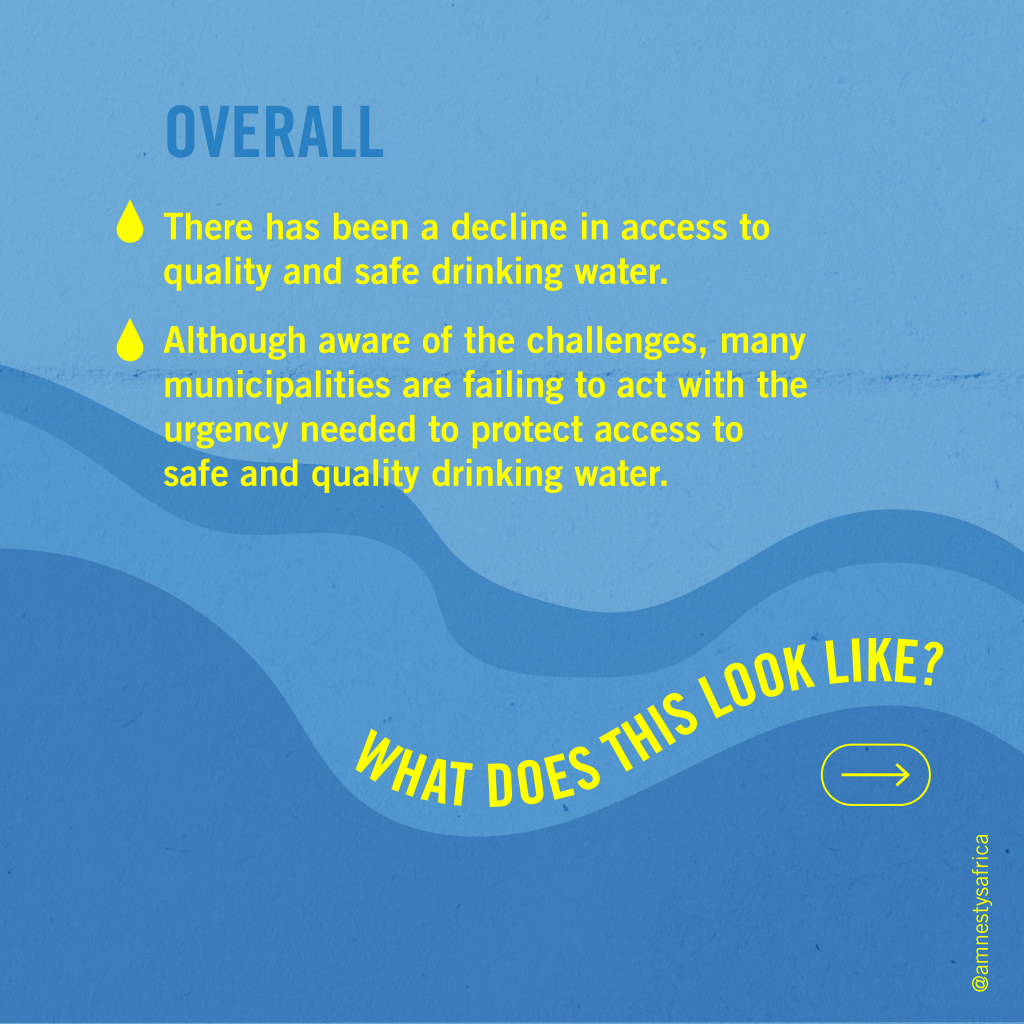
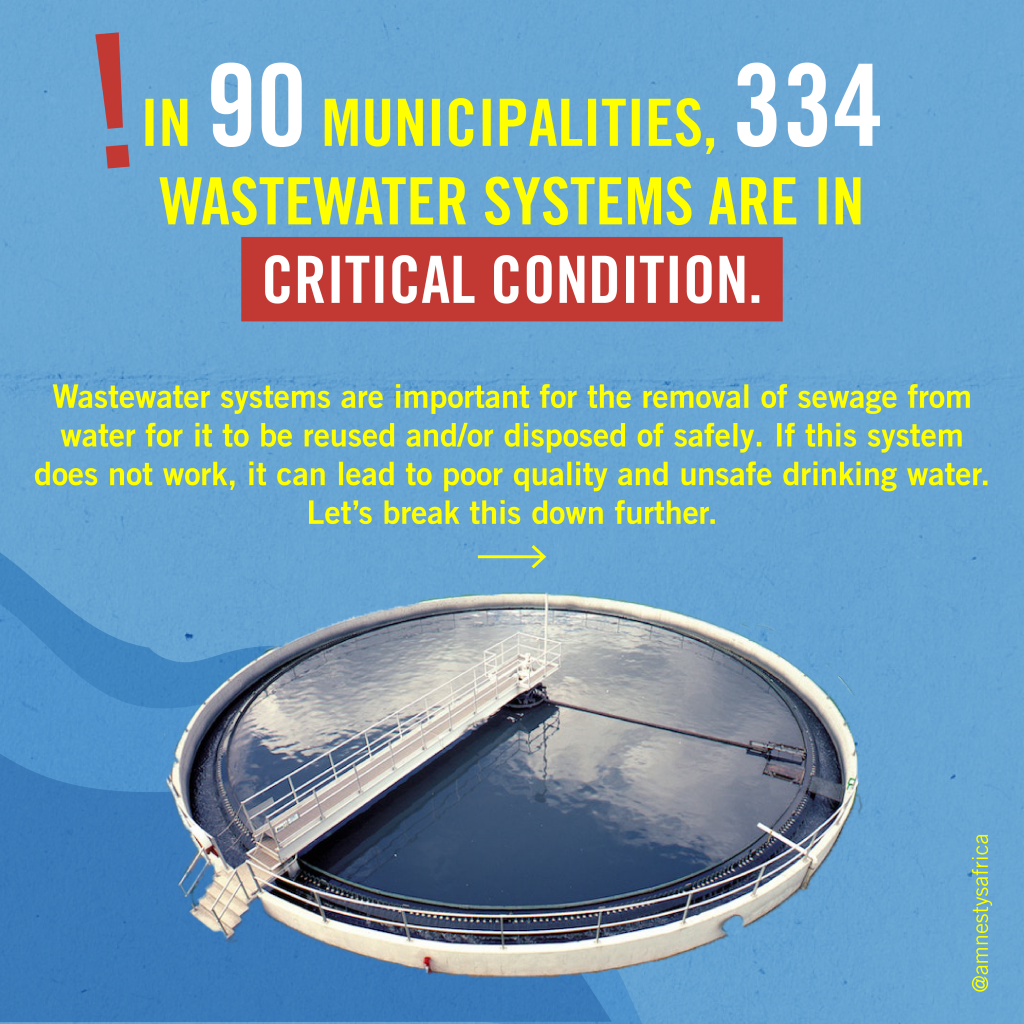
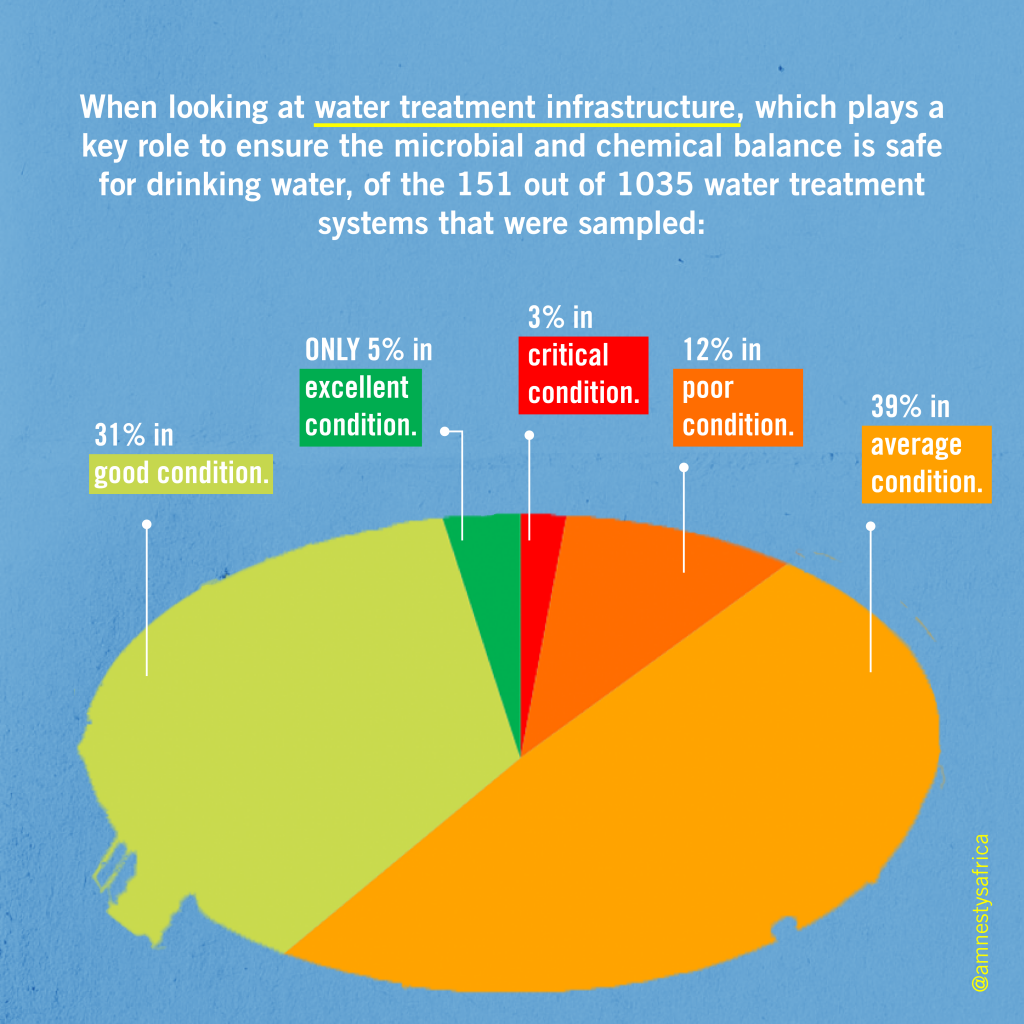
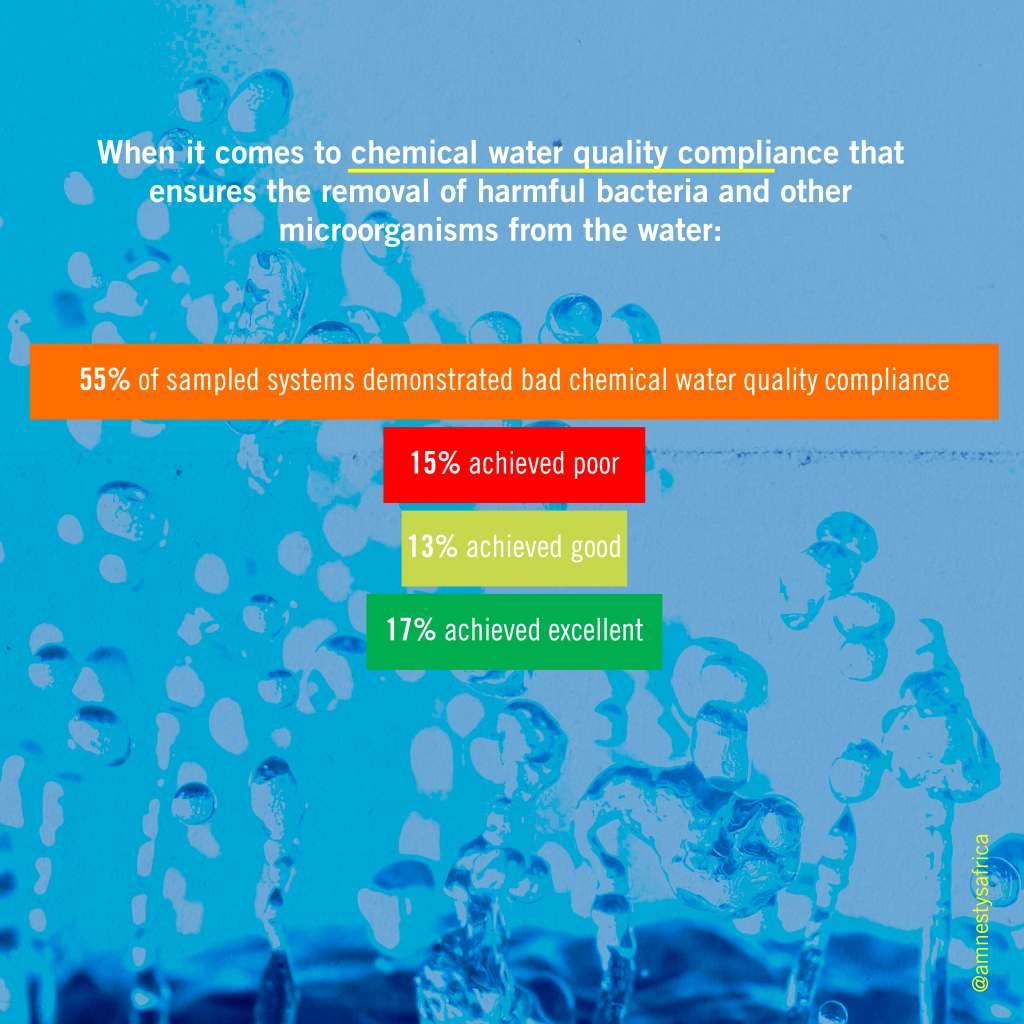
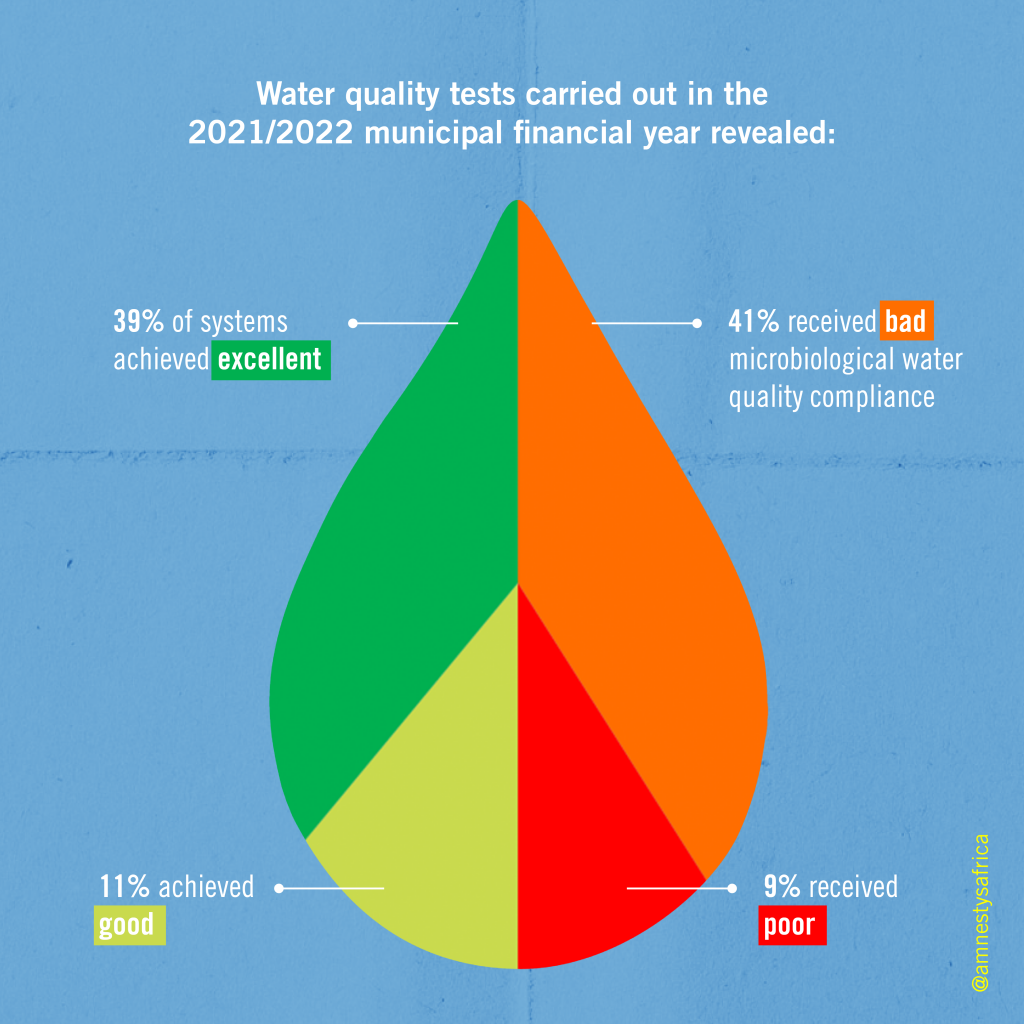
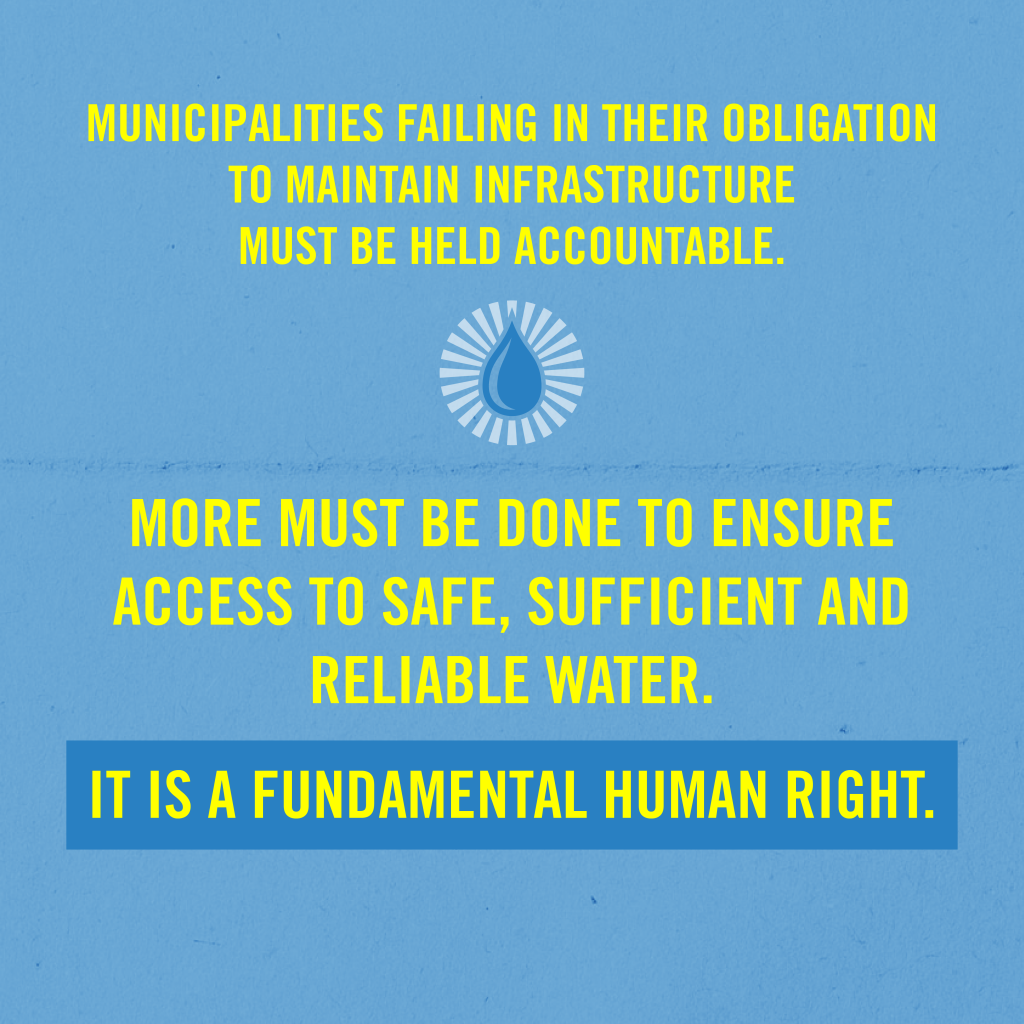
South Africa must never be a safe haven for alleged war criminals
By Sibusiso Khasa, Amnesty International South Africa Campaigner
Will South Africa arrest Vladimir Putin? That’s the question that has overshadowed the upcoming BRICS summit, which will be held in Johannesburg in August. It is not quite clear if the Russian President will attend the event. Reports have indicated that he might not come, but it is yet to be seen. At the centre of all of this is the warrant of arrest issued by the International Criminal Court (ICC) against President Putin in March.
The ICC issued warrants of arrest for President Putin and the Commissioner for Children’s Rights in the president’s office, Maria Alekseyevna Lvova-Belova on two grounds: (1) the unlawful deportation of children from Ukraine to Russia, and (2) the unlawful transfer of children from occupied areas of Ukraine to the Russian Federation. This officially made the Russian president a wanted man, and South Africa, as a signatory to the Rome Statute that established the court, must arrest and surrender him to the ICC if he sets foot in the country.
In 2015, South Africa failed to fulfil its obligation by not arresting Omar Al-Bashir, who was the president of Sudan at the time. He is accused of war crimes and crimes against humanity committed in the Darfur region. This “mistake” must never be repeated again. If South Africa allows this to happen again, it will be showing disregard for both domestic and international law. It will also indicate that the country, which is currently occupying a seat at the UN Human Rights Council, is failing to protect human rights.
The arrest warrant against President Putin, has once again cast the spotlight on the ICC and its increasingly selective approach to justice. For example, in 2020 the Office of the Prosecutor decided not to investigate war crimes by United Kingdom forces in Iraq, despite its own finding that these crimes had been committed. This was followed by a decision in 2021 to deprioritise an investigation into war crimes in Afghanistan by United States and Afghan national forces, with Prosecutor Karim Khan citing viability and budget constraints.
Amnesty International has publicly spoken out against this type of approach to justice and has cautioned that the court’s legitimacy risks being eroded by this. However, we still firmly believe that the court remains a crucial mechanism for international justice and call on the Office of the Prosecutor and state parties (including South Africa), to ensure that all investigations receive the same standard of treatment, so that all victims of international crimes have equal access to justice. Moreover, we encourage every country to become a signatory to the Rome Statute to make the world small for alleged war criminals.
Were it not for the ICC, the victims of Bosco Ntaganda, former military chief of staff of the National Congress for the Defense of the People, an armed militia group operating in the Democratic Republic of the Congo, and Dominic Ongwen, a former commander of one of the brigades of the Ugandan guerrilla group Lord’s Resistance Army, would have probably never received justice. That is why South Africa should not only remain a member of the ICC, but also fulfil its obligations to ensure that it never becomes a safe haven for people accused of war crimes and crimes against humanity.
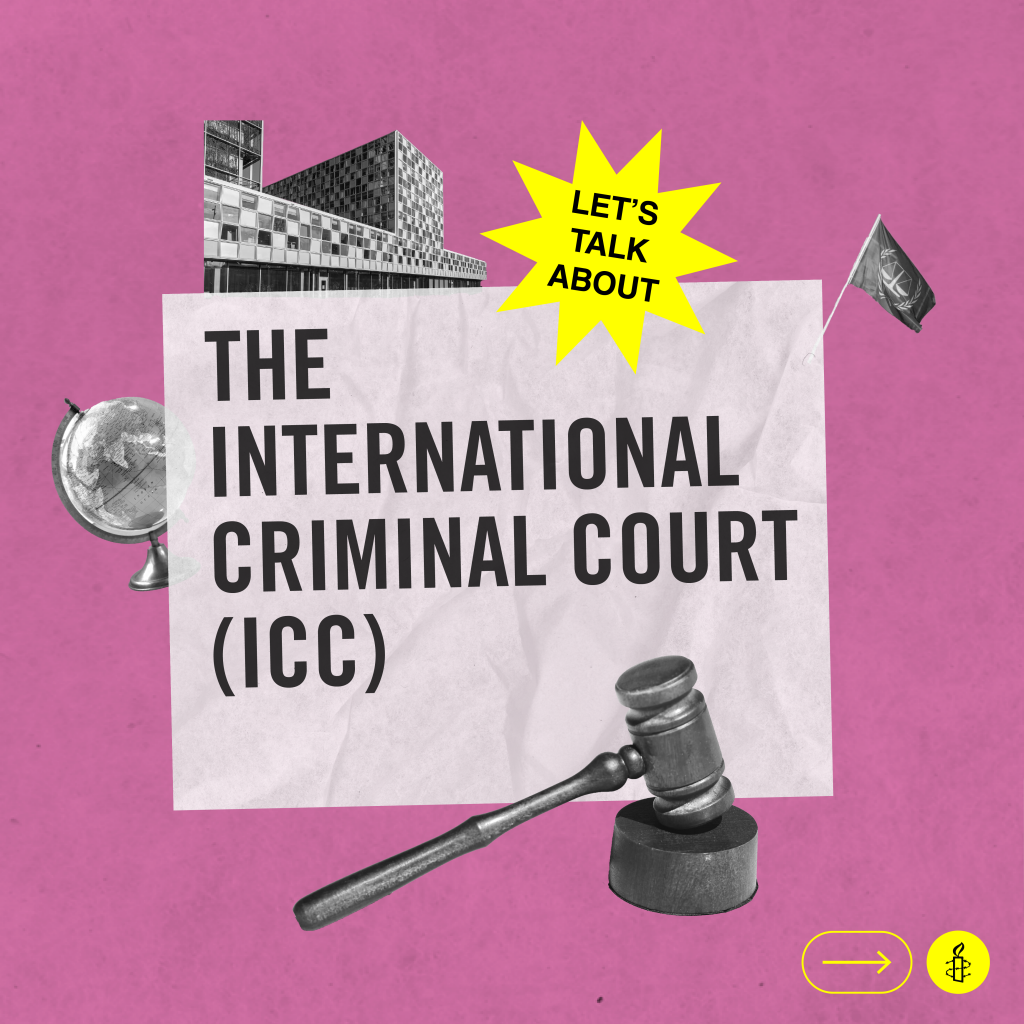
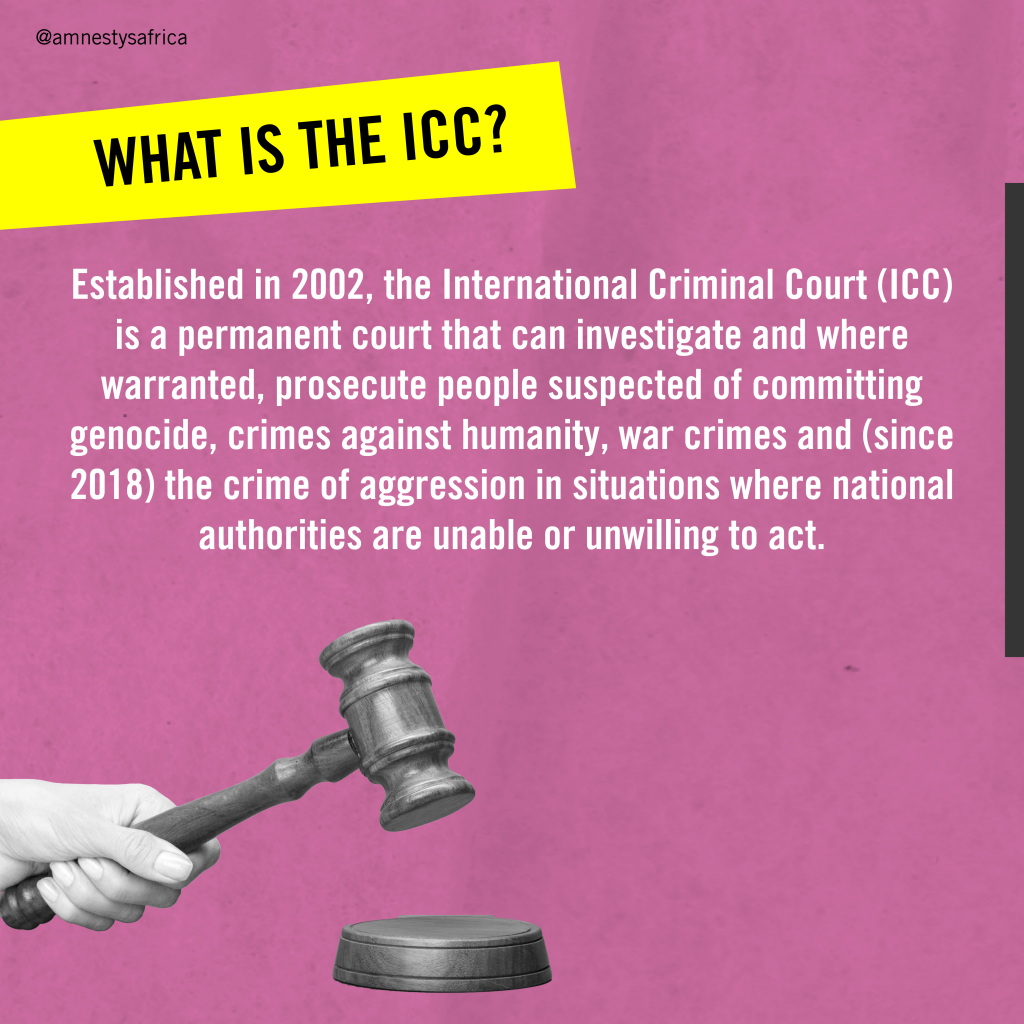
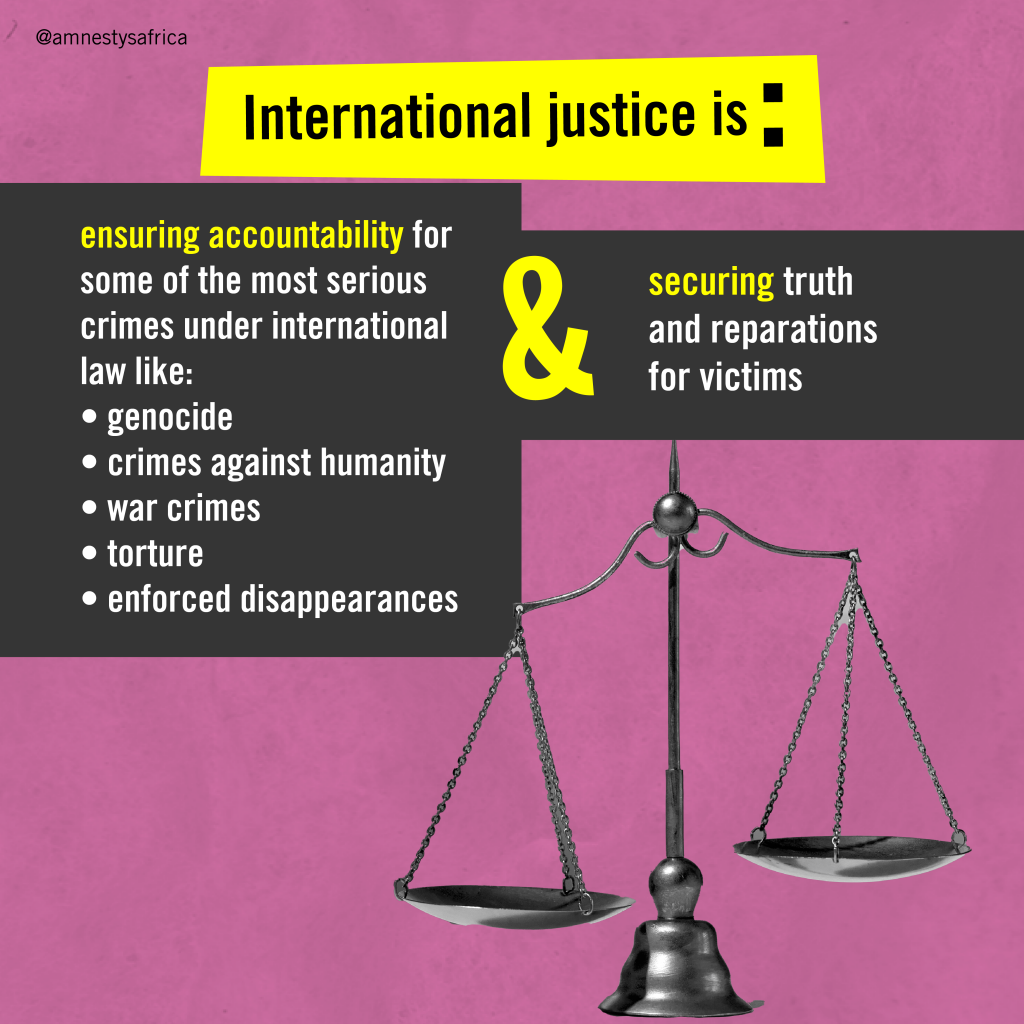
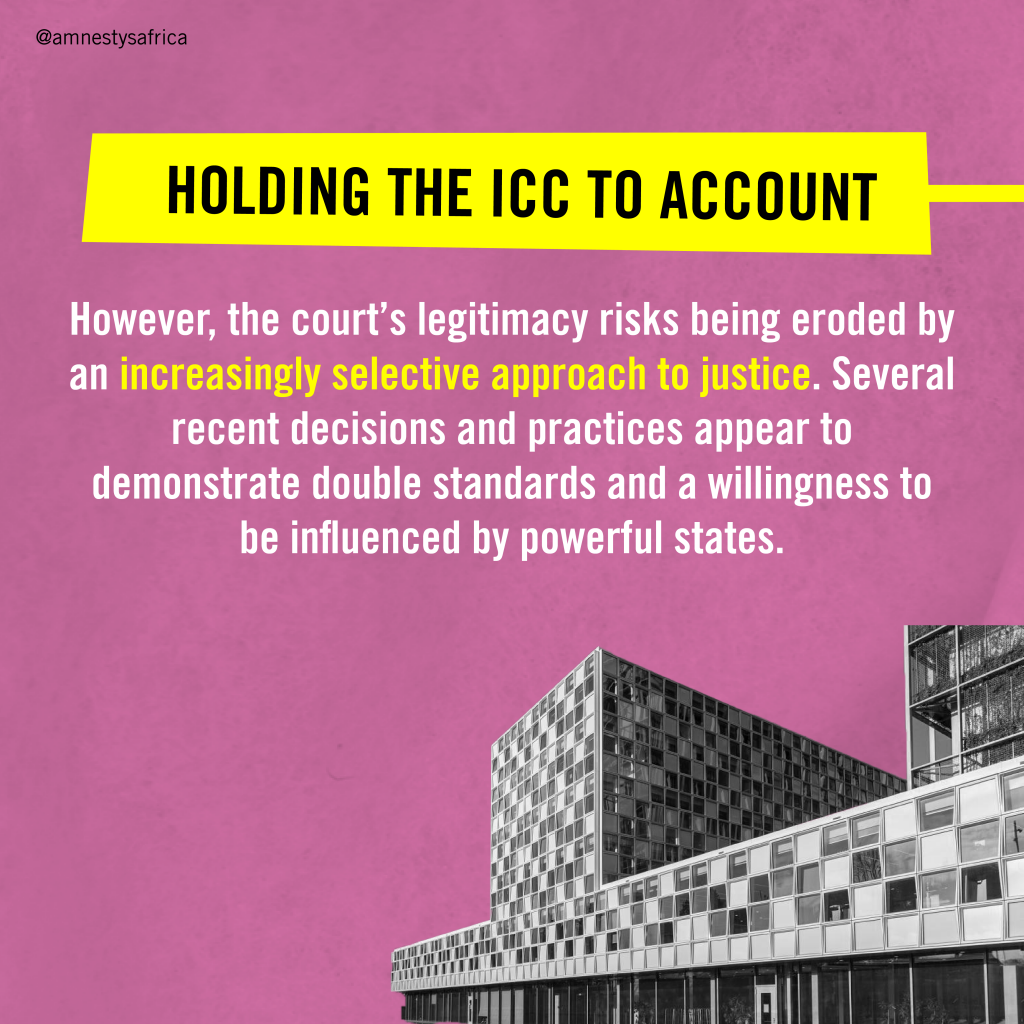
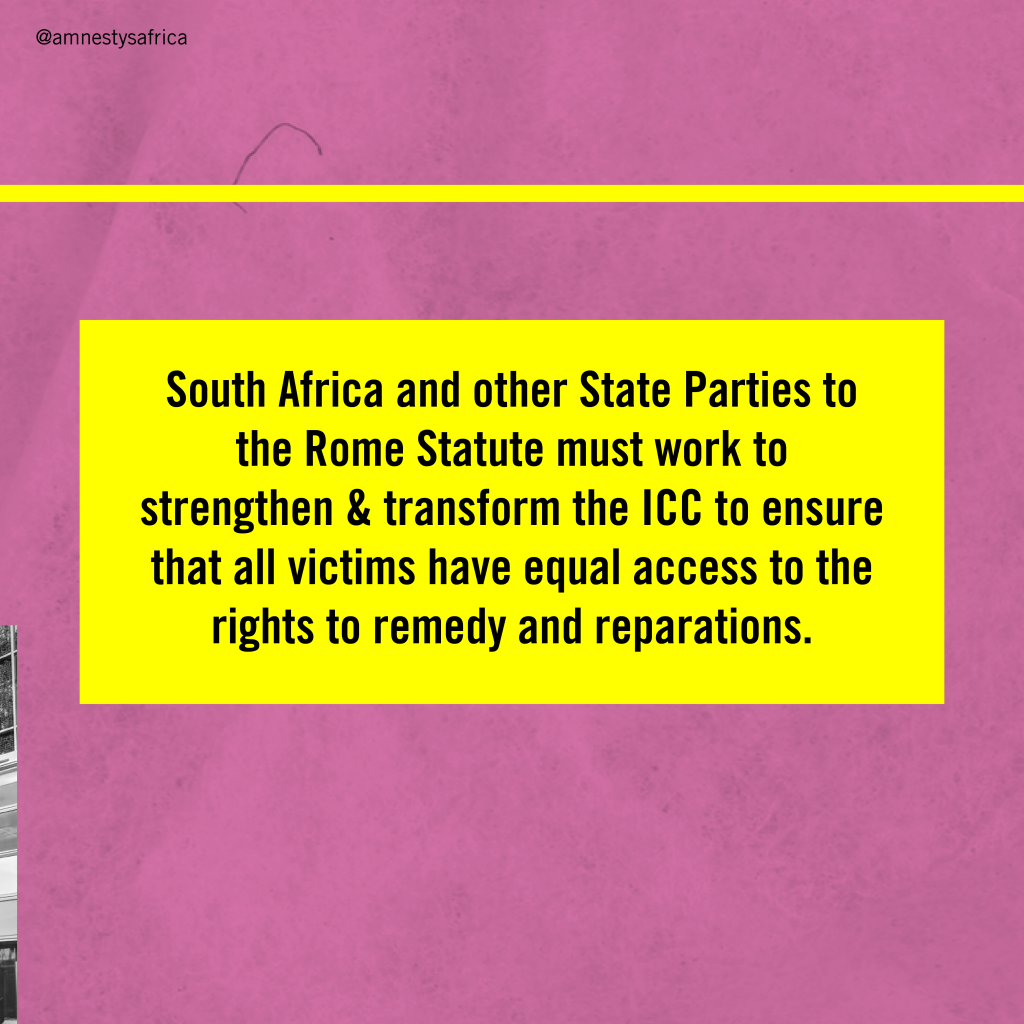
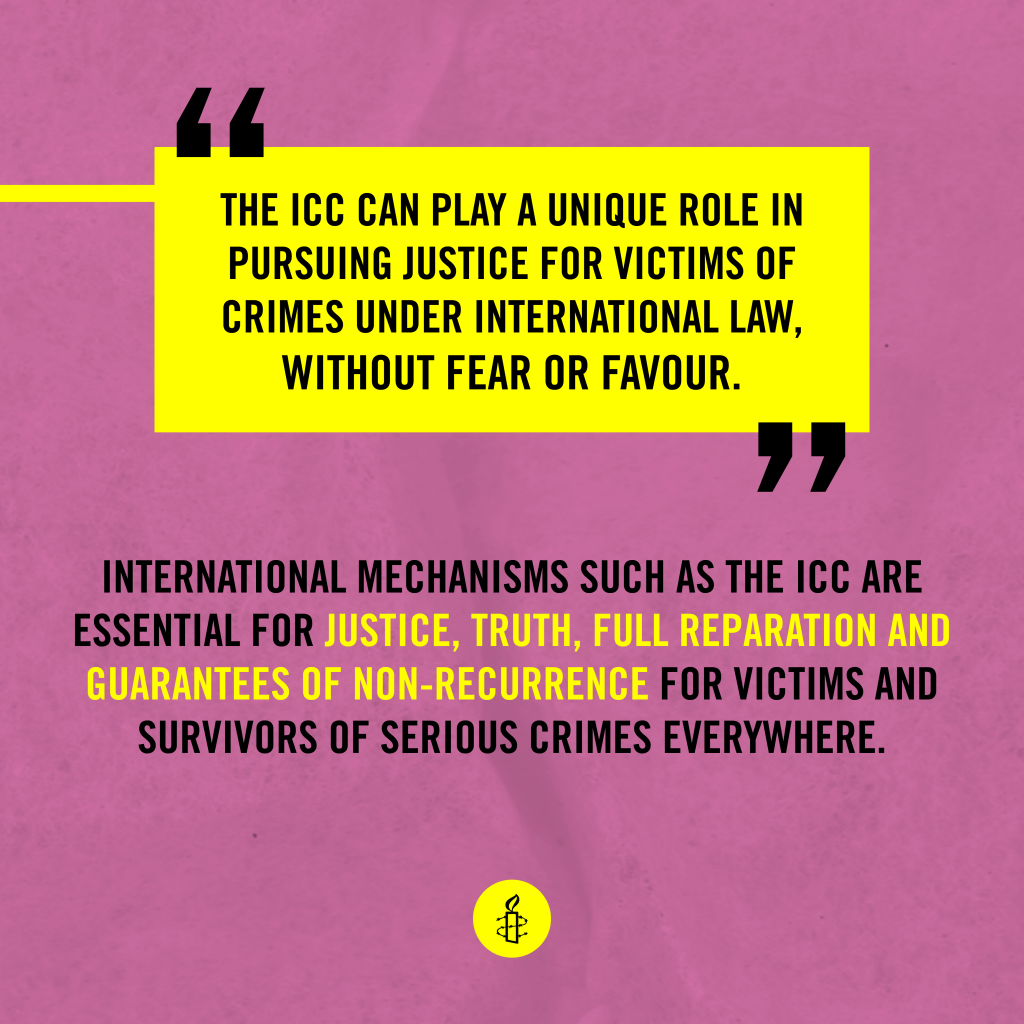
In April, President Cyril Ramaphosa referenced Amnesty International when he announced that South Africa should withdraw from the International Criminal Court (ICC), a remark that has since been clarified as an “error”.
In response Shenilla Mohamed, Executive Director of Amnesty International South Africa, said: “Amnesty has advocated for the establishment of a worldwide system of international justice to step in when states cannot or will not act, including campaigning for the establishment and effective operation of the ICC. We firmly believe that the ICC can play a unique role in pursuing justice for victims of crimes under international law and in investigating and prosecuting those suspected of responsibility for such crimes, without fear or favour, no matter how great the political or economic power of certain actors.”
Read the full statement here.
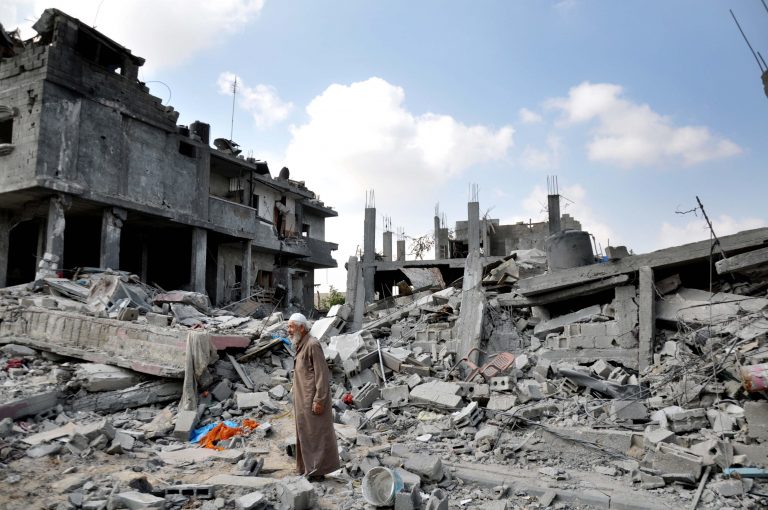
ISRAEL/OPT: WAR CRIMES MUST BE INVESTIGATED
In its early May offensive on the occupied Gaza Strip, Israel unlawfully destroyed Palestinian homes, often without military necessity, in what amounts to a form of collective punishment against the civilian population. Israel also conducted apparently disproportionate air strikes which killed and injured Palestinian civilians, including children.
Amnesty International has investigated nine Israeli airstrikes that resulted in the killing of civilians and in the damage and destruction of residential buildings in the Gaza Strip. Three separate attacks on the first night of bombing on 9 May, in which precision-guided bombs targeted three senior Al-Quds Brigades commanders, killed 10 Palestinian civilians, and injured at least 20 others. They were launched into densely populated urban areas at 2am when families were sleeping at home, which suggests that those who planned and authorised the attacks anticipated – and likely disregarded – the disproportionate harm to civilians. Intentionally launching disproportionate attacks, a pattern Amnesty International has documented in previous Israeli operations, is a war crime.
On the other side, Palestinian armed groups based in the Gaza Strip, led by Al-Quds Brigades, which is the armed wing of Palestinian Islamic Jihad, fired indiscriminate rockets which killed two civilians in Israel and three Palestinian civilians in the Gaza Strip, which should also be investigated as war crimes.
Amnesty International is calling on the International Criminal Court to investigate these attacks as war crimes and ensure that victims are granted prompt and adequate redress. We have previously called on the ICC to investigate war crimes committed in Gaza, and consider the crime against humanity of apartheid within its current investigation in the Occupied Palestinian Territories.
The root cause of this unspeakable violence is Israel’s system of apartheid. This system must be dismantled, the blockade of the Gaza Strip immediately lifted, and those responsible for the crime of apartheid, war crimes and other crimes under international law must be held to account.
Read the full statement here.
Apartheid is deprivation.
— Amnesty International (@amnesty) June 13, 2023
Apartheid is segregation.
Apartheid is fragmentation.
Apartheid is dispossession.
Israel’s apartheid over Palestinians is a crime against humanity.
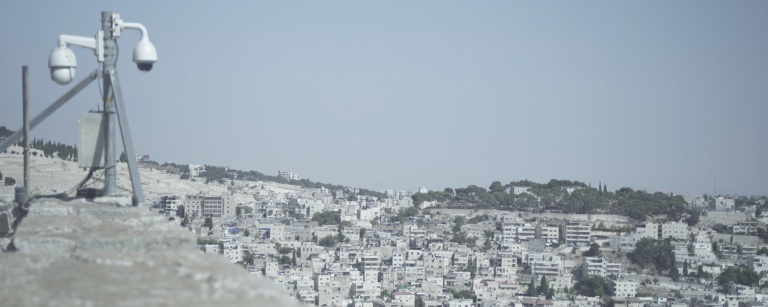
ISRAELI AUTHORITIES ARE USING FACIAL RECOGNITION TECHNOLOGY TO ENTRENCH APARTHEID
The Israeli authorities are using an experimental facial recognition system known as Red Wolf to track Palestinians and automate harsh restrictions on their freedom of movement.
In a new report, Automated Apartheid, the organisation documents how Red Wolf is part of an ever-growing surveillance network which is entrenching the Israeli government’s control over Palestinians, and which helps to maintain Israel’s system of apartheid. Red Wolf is deployed at military checkpoints in the city of Hebron in the occupied West Bank, where it scans Palestinians’ faces and adds them to vast surveillance databases without their consent.
Amnesty International also documented how Israel’s use of facial recognition technology against Palestinians in occupied East Jerusalem has increased, especially in the wake of protests and in the areas around illegal settlements.
Read more here.
Palestinians, like anyone else, have the right to live in a world that upholds equality and dignity.
— Amnesty International (@amnesty) May 2, 2023
Help dismantle Israel’s apartheid and call for an end to the supply of facial recognition technologies used in the Occupied Palestinian Territories 👉 https://t.co/hIaqRKoLBj pic.twitter.com/SlzJZbYEkd
GOVERNMENT MUST PAY ATTENTION IF IT WANTS TO AVOID ANOTHER 1976 UPRISING
If the government wants to avoid another uprising like 1976, it needs to pay attention to the needs of the youth who are feeling unheard, desperate and despondent, Amnesty International South Africa said as the country commemorated Youth Day on 16 June 2023.
“The hope of a bright and prosperous future that was created after the 1994 elections is all but gone, as the youth face the harsh reality of low quality education and high youth unemployment. The youth cannot continue to be punished for the government’s failures.”
Read the full statement here
Amnesty International South Africa Activism Coordinator: Organising Rejoyce Makhetha delivers our youth day message.
#SHAKETHECAPITAL
AISA in collaboration with the Ahmed Kathrada Foundation and the National Youth Coalition attended the second annual youth day parade at the Union Buildings for justice and change. The youth handed over a memorandum to the Presidency with the hope that the South African government would address their concerns. AISA’s youth representative, Alwande Khumalo, who is also a member of the Global Youth Collective called for change within the health sector to ensure that everyone in South Africa has access to quality healthcare.
YOUTH DAY PARADE 📍📣
— @AmnestySAfrica (@AmnestySAfrica) June 16, 2023
Today we are marching towards change! #ShakeTheCapital #YouthDay2023 #YouthDayParade pic.twitter.com/yjlNjuyZwZ
The Daily Maverick covered the event and wrote about how speakers invoked the spirit of ’76. One of those speakers was Alwande Khumalo, Amnesty International South Africa’s Global Youth Collective Representative.
Read the full article here.
The right to access sexual & reproductive health services
Amnesty International South Africa hosted an Instagram live on 29 June 2023 on your right to access sexual & reproductive health services with Section27 and Children of Success. This was part of our youth day discussions speaking about the right to access contraceptives.
Watch a recording of the discussion below.
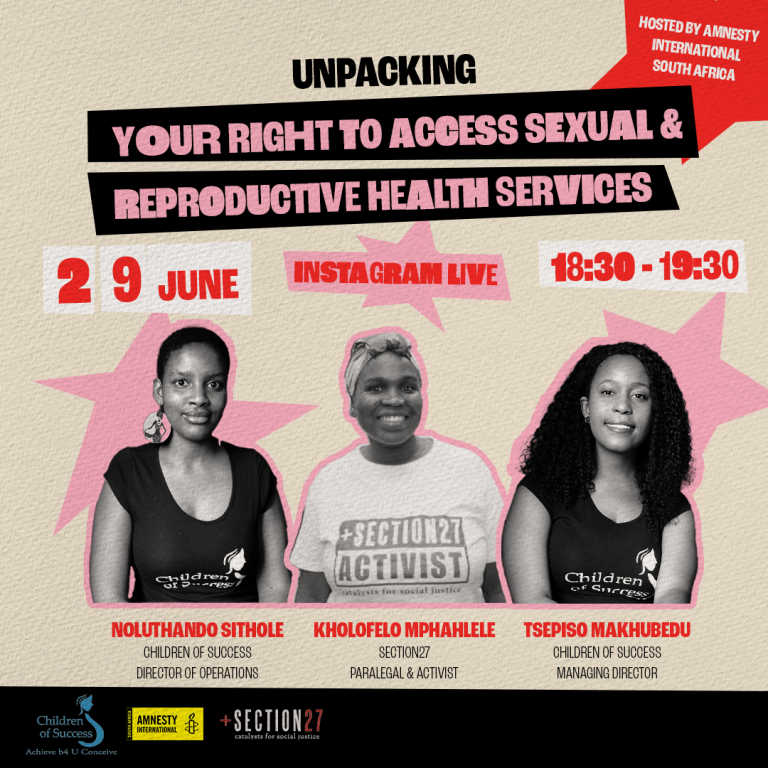
NHI is not a silver bullet to fix crumbling health system
By Marike Keller, Researcher, Amnesty International South Africa
According to our Constitution and international law, everyone in South Africa “has the right to have access to health care services”. Yet we know all too well that for many people living in this country, this right is not fully realised. The public health system is riddled with corruption, inequality, discrimination, and poor infrastructure.
Taking steps towards achieving universal access to quality health care, the government proposed and initiated the roll out of National Health Insurance (NHI). The NHI Bill is a proposal that seeks to fundamentally change South Africa’s health financing system by creating a single NHI Fund, from which the government will purchase health care services, with the aim to ensure fair and equitable distribution and use of health services for all. However, it is not that clear cut.
Tabled in 2019, the Bill received widespread concerns that it may result in the regression in access to healthcare services. Chief amongst these was the governance of the fund and risk of widespread corruption; too much power allocated to the Minister of Health alone; the exclusion of asylum seekers and undocumented migrants; and the current crumbling state of the public healthcare system. Investment and improvement in infrastructure, human resources, and governance would be necessary before universal health care can become a reality. And yet, on an almost daily basis, we hear and see reports of public hospitals and clinics being short-staffed; budget constraints leading to hiring freezes and understaffing – particularly in rural areas; poor working and sanitary conditions for staff and patients; patients waiting days to be seen to with infrastructure literally crumbling around them; and vulnerable populations being discriminated against and turned away when seeking medical care. Not to mention the negative impact loadshedding has had on health facilities and access to care. Given the state the public health system is in, the NHI is not the silver bullet the government is making it out to be.
Despite opposition parties not supporting it, the Bill was passed in the National Assembly on 12 June. It has now been passed on to the National Council of Provinces (NCOP) for consideration. Should the NCOP approve the Bill, it will be sent to the President to sign into law.
Amnesty International has called on the government to address the challenges in the public health sector prior to adopting and enforcing the NHI. This includes addressing the shortage of medical personnel, maintaining facilities, and improving services and care. This, in addition to resolving the concerns raised in public submissions regarding corruption, governance, and the exclusion of asylum seekers and undocumented migrants, will contribute towards ensuring the success of the NHI – in the future – to make healthcare more accessible to all persons in South Africa.
DEATH PENALTY 2022: RECORDED EXECUTIONS SKYROCKET TO HIGHEST FIGURE IN FIVE YEARS
Highest number of judicial executions recorded globally since 2017
81 people executed in a single day in Saudi Arabia
20 countries known to have carried out executions
Six countries abolished the death penalty fully or partially
Recorded executions in 2022 reached the highest figure in five years, as the Middle East and North Africa’s most notorious executioners carried out killing sprees, Amnesty International said today as it released its annual review of the death penalty.
A total of 883 people were known to have been executed across 20 countries, marking a rise of 53% over 2021. This spike in executions, which does not include the thousands believed to have been carried out in China last year, was led by countries in the Middle East and North Africa, where recorded figures rose from 520 in 2021 to 825 in 2022.
“Countries in the Middle East and North Africa region violated international law as they ramped up executions in 2022, revealing a callous disregard for human life. The number of individuals deprived of their lives rose dramatically across the region; Saudi Arabia executed a staggering 81 people in a single day. Most recently, in a desperate attempt to end the popular uprising, Iran executed people simply for exercising their right to protest,” said Agnès Callamard, Amnesty International’s Secretary General.
Disturbingly, 90% of the world’s known executions outside China were carried out by just three countries in the region.
Recorded executions in Iran soared from 314 in 2021 to 576 in 2022;
figures tripled in Saudi Arabia, from 65 in 2021 to 196 in 2022 — the highest recorded by Amnesty in 30 years —
Egypt executed 24 individuals.
The use of the death penalty remained shrouded in secrecy in several countries, including China, North Korea, and Viet Nam — countries that are known to use the death penalty extensively — meaning that the true global figure is far higher. While the precise number of those killed in China is unknown, it is clear that the country remained the world’s most prolific executioner, ahead of Iran, Saudi Arabia, Egypt and the USA.
Five countries resumed executions
Executions resumed in five countries in 2022 — Afghanistan, Kuwait, Myanmar, the State of Palestine and Singapore — while an increase in executions was also recorded for Iran (314 to 576), Saudi Arabia (65 to 196), and the USA (11 to 18).
The recorded number of people executed for drug-related offences more than doubled in 2022 compared to 2021. Drug-related executions are in violation of international human rights law which states that executions should only be carried out for the ‘most serious crimes’ – crimes that involve intentional killing. These executions were recorded in China, Saudi Arabia (57), Iran (255) and Singapore (11), and amounted to 37% of total executions recorded globally by the organisation. Executions for drug-related offences were likely to have been carried out in Viet Nam, yet these figures remain state secrets.
“In a cruel twist, close to 40% of all known executions were for drug-related offences. Importantly, it’s often those from disadvantaged backgrounds that are disproportionately affected by this callous punishment,” said Agnès Callamard. “It’s time for governments and the UN to up the pressure on those responsible for these blatant human rights violations and ensure international safeguards are put in place.”
While executions were up, the total number of recorded death sentences imposed on people remained essentially the same, with a slight decrease from 2,052 in 2021 to 2,016 in 2022.
A glimmer of hope
Against this bleak backdrop, there was a glimmer of hope as six countries abolished the death penalty either fully or partially.
Kazakhstan, Papua New Guinea, Sierra Leone and the Central African Republic abolished the death penalty for all crimes, while Equatorial Guinea and Zambia abolished the death penalty for ordinary crimes only.
As of December 2022, 112 countries had abolished the death penalty for all crimes and nine countries had abolished the death penalty for ordinary crimes only.
The positive momentum continued as Liberia and Ghana took legislative steps toward abolishing the death penalty, while the authorities of Sri Lanka and the Maldives said they would not resort to implementing death sentences. Bills to abolish the mandatory death penalty were also tabled in the Malaysian Parliament.
“As many countries continue to consign the death penalty to the dustbin of history, it’s time for others to follow suit. The brutal actions of countries such as Iran, Saudi Arabia as well as China, North Korea and Viet Namare now firmly in the minority. These countries should urgently catch up with the times, protect human rights, and execute justice rather than people,” said Agnès Callamard.
“With 125 UN member states — more than ever before — calling for a moratorium on executions, Amnesty International has never felt more hopeful that this abhorrent punishment can and will be relegated to the annals of history. But 2022’s tragic figures remind us that we can’t rest on our laurels. We will continue to campaign until the death penalty is abolished across the globe.”
Download the report here.
YOUTH ARE BEARING THE BRUNT OF THE GOVERNMENT’S FAILURES
In response to the Department of Basic Education’s (DBE) release of the outcome of South Africa’s Progress in International Reading Literacy Study (PIRLS) 2021 assessment, Shenilla Mohamed, Executive Director of Amnesty International South Africa, said:
“The finding that over 80% of Grade 4 learners in South Africa cannot read for meaning is shocking and illustrates that the government continues to fail to respect, protect, promote and fulfil the right to basic education for all, a right that has been recognised by the Constitutional Court of South Africa as immediately realisable.
“If this is not a wake-up call, we don’t know what is. South Africa’s education system continues to be broken and unequal, risking snuffing out the potential bright futures of children across the country.
Read more here.
AUTHORITIES MUST ACT WITH URGENCY TO PREVENT FURTHER CHOLERA DEATHS
In response to reports that 15 people have died of cholera in Gauteng, Shenilla Mohamed, Executive Director of Amnesty International South Africa, said:
“People are dying of a preventable and easily treatable disease. This is deeply troubling and unacceptable. Cholera is caused by the intake of contaminated food or water – food and water that should be safe to eat and drink, not contaminated with potentially deadly bacteria.
“The provision of safe water and sanitation is critical in preventing and controlling the transmission of cholera. Despite the Gauteng Health Department’s warning to residents not to drink the tap water, and confirmation that further samples are being tested, now is the time for the Department of Water and Sanitation (DWS) to work with municipalities, such as the City of Tshwane and across the country, to act in the short- and long-term, and invest in and manage South Africa’s basic water and sanitation infrastructure.
Read more here.
THE STATE MUST TAKE URGENT ACTION TO PROTECT THE RIGHTS TO LIFE AND SECURITY OF THE PERSON
In response to reports of a family of ten people killed in their Pietermaritzburg home, Shenilla Mohamed, Executive Director of Amnesty International South Africa, said:
“In less than a week, we’ve seen the killing of Loyiso Nkohla in Cape Town, the reported mass murder of ten family members in Pietermaritzburg, and the murder and mutilation of two young boys in Soweto, and these are only the murders that have been widely reported on. According to the latest quarterly crime statistics an average of 82 people are murdered in South Africa every day. No-one is safe here.
“Government continues to fail in its constitutional mandate to create a safe environment for all. The rights to life and security of the person – enshrined in the Constitution and the Universal Declaration of Human Rights – are violated daily and it must stop.
Read more here.
The mass killing of 10 people in #Pietermaritzburg, the killing of Loyiso Nkohla in Cape Town & the murder & mutilation of two children in Soweto are yet further chilling examples of @GovernmentZA’s failure to create a safe environment for all. pic.twitter.com/aiGeOdntwX
— @AmnestySAfrica (@AmnestySAfrica) April 21, 2023
The #CholeraOutbreak that has reportedly claimed 15 lives in #Hammanskraal is deeply troubling. @CityTshwane must be transparent with communication on the source of the outbreak & ensure the issue is resolved with urgency.
— @AmnestySAfrica (@AmnestySAfrica) May 22, 2023
It is of deep concern that @GovernmentZA is once again considering withdrawing from the @IntlCrimCourt rather than working to transform and strengthen it 👇: https://t.co/2MO3PVsVwv
— @AmnestySAfrica (@AmnestySAfrica) April 25, 2023
In the first quarter of 2023, Amnesty International South Africa carried out 27 interviews, on various topics.
On 27 April 2023, Amnesty International South Africa Campaigner Sibusiso Khasa spoke to Newzroom Afrika about the importance of the International Criminal Court (ICC) cand how it remains a key instrument for global justice through its ability to investigate and prosecute crimes against humanity.
Watch the interview here.
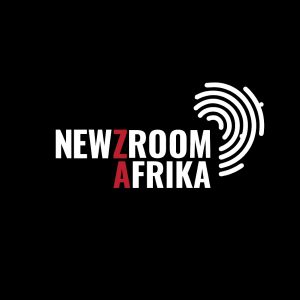
On 19 May 2023, Amnesty International South Africa Media and Communications Officer (maternity cover) Mienke Steytler spoke to eNCA about the frightening findings on South Africa’s literacy. The study found that over 80% of Grade 4 children cannot read for meaning.
Watch the interview here.

On 22 May 2023, Amnesty International South Africa Senior Programme Officer Alicia Jooste spoke to eNCA about the cholera crisis in Hammanskraal.
Watch the interview here.

On 19 June 2023, Amnesty International South Africa Media and Communications Officer Genevieve Quintal spoke to SAFM about how the government needs to take the youth seriously if it wants to avoid another 1976 uprising.
Listen the interview here.

YOUTH ACTIVISM
AI Durban
AISA’S Durban community chapter hosted a gathering on 10 June with AISA’s Executive Director, Shenilla Mohamed, HR and Finance Manager, James Jairos, and Activism Coordinator: Organising, Rejoyce Makhetha. The meeting discussed the chapter’s plans and ways of working especially as it celebrates more than 30 years since its inception.
AI Vaal Film Festival (Savannah City)
On 16 June, the AI Vaal Savannah City chapter hosted a Amalungelo Wethu film screening with the aim of providing human rights education and facilitating dialogue on issues affecting young people after 29 years of freedom in South Africa.
AI Vaal Evaton gender-based violence and early pregnancy dialogue (Evaton)
On 17 June, AI Vaal (Evaton) facilitated a community dialogue with the youth in an attempt to determine the role of gender-based violence in early pregnancy.
YOUTH NEWSLETTER
Amnesty International South Africa publishes a monthly youth newsletter, YOU(th) for YOU(th), where you can see more of what our youth activists are doing and get their views on human rights issues.
You can find all our youth newsletters here.
You can read the most recent editions below.
Matla! Ke a rona! (The power is ours!)
SUDAN: PARTIES TO THE CONFLICT MUST ENSURE PROTECTION OF CIVILIANS AS DEATHS MOUNT
Following the outbreak of armed conflict between the Sudan Armed Forces (SAF) and Rapid Support Forces (RSF), an independent paramilitary force, which erupted on the morning of 15 April in Khartoum, Amnesty International’s Regional Director for East and Southern Africa Tigere Chagutah said:
“The use of heavy weaponry including artillery, tanks and jet aircraft in densely populated areas in Khartoum has caused numerous civilian deaths and massive destruction of property. Civilians are caught in the middle of this conflict and are suffering. The parties to the conflict must immediately stop using explosive weapons with wide area effects in the vicinity of concentrations of civilians.
“Sudan’s regional and international partners including the Intergovernmental Authority on Development (IGAD), African Union, UN and others should publicly call on the parties to the conflict to respect international humanitarian law and protect civilians. Both parties must immediately stop their indiscriminate attacks.
Read the full statement here.
ZIMBABWE: 43 YEARS INDEPENDENCE COMMEMORATION MARRED BY RAPIDLY SHRINKING CIVIC SPACE AND DECLINE IN FREEDOMSOn 18 April Zimbabweans marked 43 years of independence from colonial rule amid the reality of a rapidly shrinking civic space, including criminalizing of dissent against political activists and human rights defenders. “Forty-three years after independence, authorities are still yet to guarantee in practice the rights to freedom of expression, association and peaceful assembly which are increasingly being threatened despite being guaranteed under the constitution and international law,” said Flavia Mwangovya, Amnesty International’s Deputy Director for East and Southern Africa. “The right to freedom of peaceful assembly has continuously been violated and undermined with the authorities refusing to give clearance for some of the main opposition party’s rallies, arresting and convicting peaceful protesters and using unnecessary and excessive force to stop protests. Read the full statement here. |
Angola: Authorities detaining seriously ill activist for more than 500 days, despite a judge ordering his release
Angola authorities must release Tanaice Neutro, an activist who is being detained arbitrarily for more than 500 days despite suffering from severe health issues.
Tanaice Neutro was arrested on 13 January 2022 after he allegedly shared a video online in which he called Angolan President João Lourenço a “clown” and said the Angolan authorities are “ignorant”. He has been arbitrarily detained since then despite a court order for his release due to his ill health in October 2022.
He has been suffering from severe physical health conditions, including intense headaches and fever, and urgently requires surgery for a condition that prevents him from receiving proper nutrition. There have also been grave concerns over his mental health.
“It is a travesty of justice that Tanaice Neutro remains in detention. Despite the court ordering his release, the Angolan authorities continue to refuse granting him liberty. He, along with all others who are being detained in the country merely for exercising their right to protest, should be immediately and unconditionally released,” said Tigere Chagutah, Amnesty International’s Regional Director for East and Southern Africa.
Read the full statement here.
Uganda: President’s approval of anti-LGBTI Bill is a grave assault on human rights.
Responding to the news that President Yoweri Museveni assented to Uganda’s Anti-Homosexuality Bill 2023, which criminalizes same-sex sexual acts between consenting adults, Flavia Mwangovya, Amnesty International’s Deputy Regional Director said:
“This is a desperately dark day for LGBTI rights and for Uganda. The signing of this deeply repressive law is a grave assault on human rights and the Constitution of Uganda and the regional and international human rights instruments to which Uganda is a party . The Anti-Homosexuality Bill, 2023 will do nothing other than enshrine discrimination, hatred and prejudice against LGBTI Ugandans and their allies into law. It’s unconscionable that they risk losing their lives, their freedom, their privacy, their freedom of expression and their ability to live free from discrimination.
Read the full statement here.
How does public debt affect the right to health: Case studies in East and Southern Africa
The implication of debt on human rights is becoming an increasingly significant concern – especially in the Eastern and Southern Africa region.
Many countries in the region are either already in a debt crisis or approaching debt distress. This is not a new phenomenon for the region, as 15 of the 25 countries in East and Southern Africa were part of the Heavily Indebted Poor Countries initiative.
The COVID-19 pandemic exacerbated the ability of many countries to both service debt and meet the increasing health needs of their citizens. Research shows that some governments in the region chose to borrow more funds to support at-risk groups and build health infrastructure to respond to the pandemic.
Read the full statement here.
EAST AND SOUTHERN AFRICA: ATTACKS ON JOURNALISTS ON THE RISE AS AUTHORITIES SEEK TO SUPPRESS PRESS FREEDOM
Authorities across East and Southern Africa escalated their attacks against journalists and press freedom across the region to suppress reporting of corruption and human rights violations throughout 2022, the Media Institute of Southern Africa and Amnesty International said to mark World Press Freedom Day.
“There has been a worrying trend of attacks, harassment, intimidation and the criminalization of journalism across East and Southern Africa demonstrating the length to which authorities are prepared to go to silence the media for exposing allegations of corruption and human rights violations,” said Tigere Chagutah, Amnesty International’s Director for East and Southern Africa.
Read the full statement here.
UAE: STATES MUST URGE THE UNITED ARAB EMIRATES TO REFORM ITS DISMAL RIGHTS RECORD TO HELP ENSURE A SUCCESSFUL CLIMATE MEETING
Amnesty Interational called on states which participated in a climate meeting in Bonn earlier this month, to urge the United Arab Emirates to improve its dismal human rights record to ensure a successful COP28 conference, which will be held in Dubai.
An Amnesty International briefing, titled The Human Rights Situation in the UAE ahead of COP28, identifies key human rights risks in the United Arab Emirates (UAE) that threaten the success of COP28, including the suppression of the right to freedom of expression and a closure of civic space, the danger of digital espionage and monitoring, and the host country’s opposition to the rapid phasing out of fossil fuels.
Read the full statement and briefing paper here.
AMNESTY INTERNATIONAL CALLS FOR UNIVERSAL SOCIAL PROTECTION, AS OVERLAPPING CRISES LEAVE HUNDREDS OF MILLIONS FACING DISASTER
Amnesty International is calling for social security to be made available to everyone worldwide after a series of crises exposed huge gaps in state support and protection systems, leaving hundreds of millions facing hunger or trapped in a cycle of poverty and deprivation.
In a briefing issued today, Rising Prices, Growing Protests: The Case for Universal Social Protection, the human rights organisation also calls for international debt relief, and urges states to enact tax reforms and clampdown on tax abuse, to free up substantial funding to pay for social protection.
Read the full statement here.
USA: One year on, overturning of Roe vs. Wade has fueled human rights crisis
On the one-year anniversary of the US Supreme Court decision that overturned Roe vs. Wade, Tarah Demant, National Director of Programs at Amnesty International USA, said:
“One year after the Supreme Court shamefully stripped millions of their rights, women, girls, and people who can become pregnant in the United States are facing an unprecedented human rights crisis.
Read the full statement here.
Global: Human rights should be essential to FIFA’s choice of World Cup 2030 host, poll shows
A global coalition of human rights groups, trade unions, players and fans is urging FIFA to ensure that human rights are a primary consideration in choosing which countries can host the 2030 men’s football World Cup.
With the bidding process expected to begin soon, the Sport & Rights Alliance asks FIFA to ensure that the bid evaluation process reflects the results of an opinion poll commissioned by Amnesty International and conducted in 15 countries, which showed that a majority of the public, 53%, believe human rights should be a critical consideration in deciding who hosts major international sporting events.
Steve Cockburn, Amnesty International’s head of economic and social justice, said: “It is clear that the public wants human rights to be a high priority so that the World Cup is a celebration of the game they love and never provides a platform for exploitation, repression or discrimination.
Read the full statement here.

